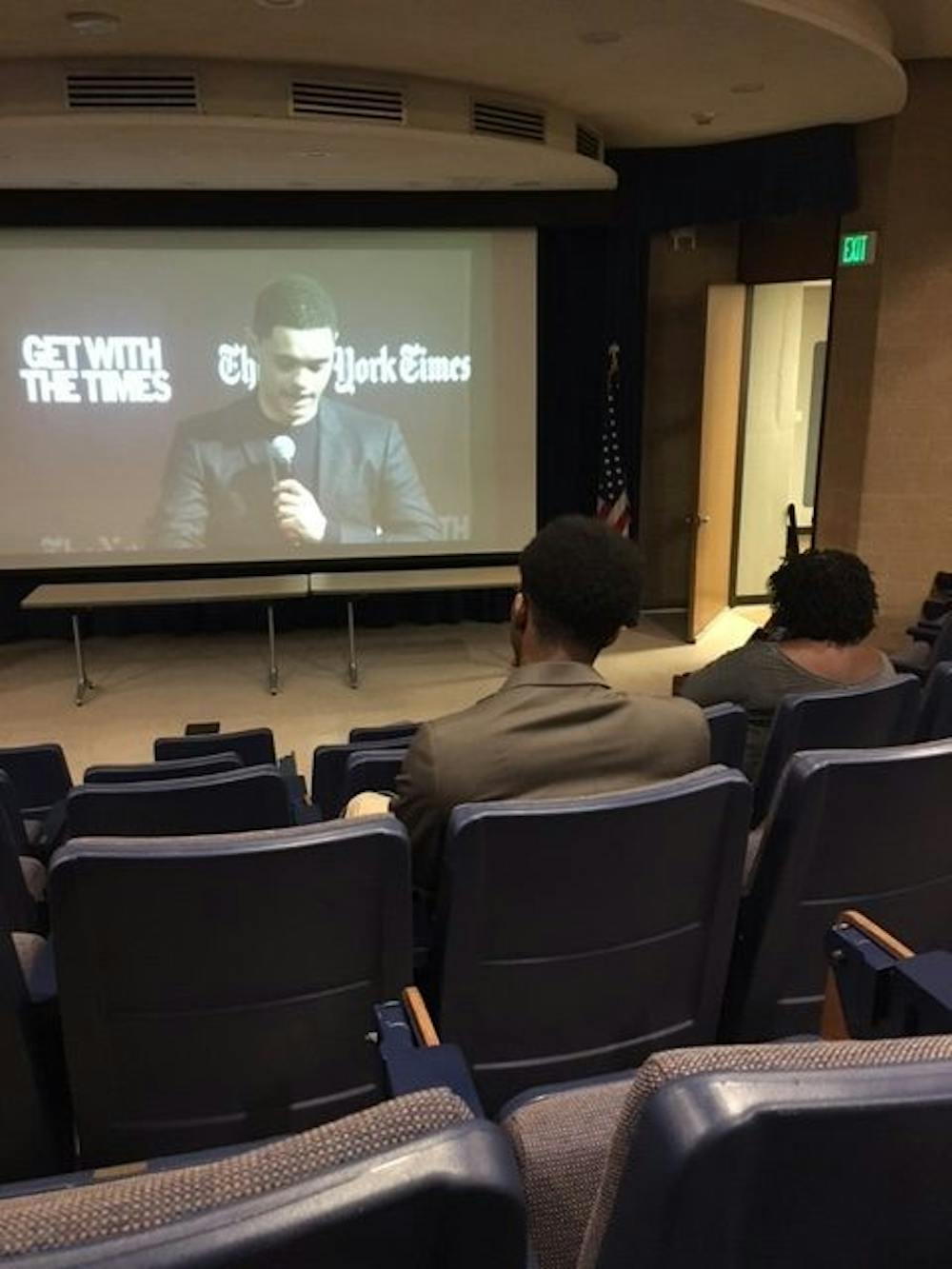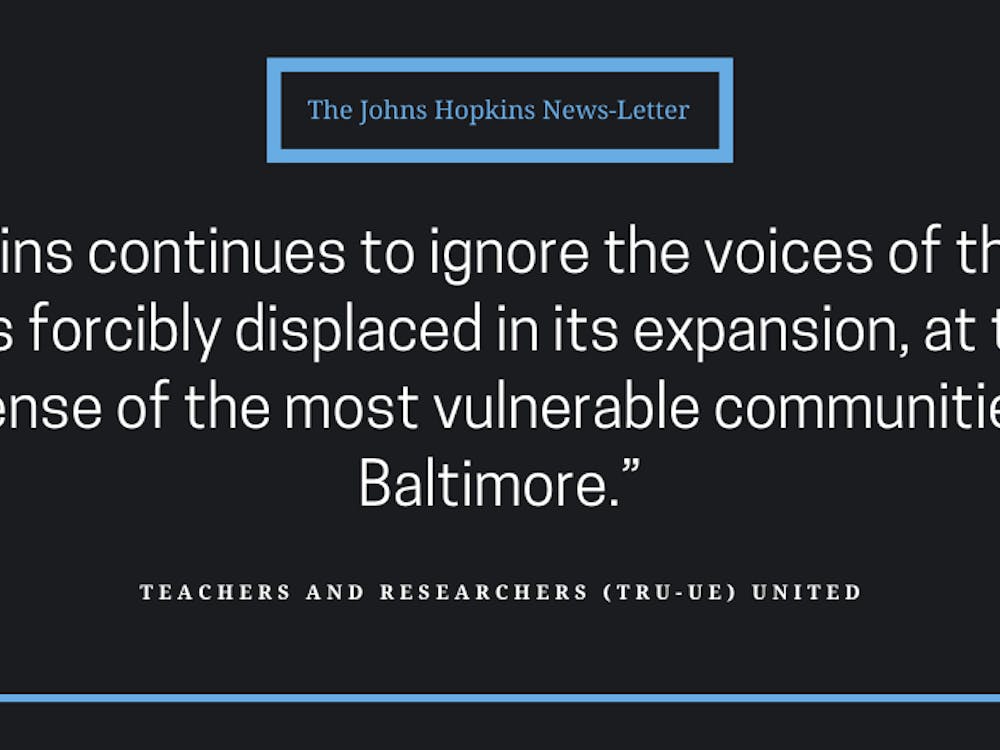Trevor Noah, host of The Daily Show, spoke with John Eligon, a national correspondent who writes about race relations for The New York Times, as part of “Get With the Times,” an event co-hosted by The Times and the Medill School of Journalism, Media, Integrated Marketing Communications.
The event took place at Northwestern University and was live streamed at over 100 college campuses across the country.
Hopkins hosted two watch parties, one at the School of Medicine and one at the Homewood Campus.
Noah began by reading a chapter from his memoir, Born a Crime, in which he described growing up in South Africa during apartheid. He then spoke about how his perceptions of African Americans changed after he moved to the U.S.
“I didn’t understand why black Americans would aspire to Africa,” he said. “You don’t realize how many black Americans have been robbed of a place they believe to be home and a culture and a story.”
Eligon asked Noah about how U.S. President Donald Trump has impacted race relations.
“Do you think in some ways that the Trump presidency can be seen as a good thing, in that it exposes rifts that people thought were gone and in the past?” Eligon asked.
In response, Noah said that he is optimistic that the American people can overcome the difficulties that the Trump administration has created.
“Donald Trump is president and in many ways, has emboldened racist people all over America,” he said. “What good can come from it is, in my opinion, is that conversations can no longer be masked.”
Noah believes that the election has had a profound impact on the country.
“Donald Trump is forcing people to choose. He is slowly testing the resolve of people,” Noah said.
Although Noah believes that the U.S. has made much progress in including minorities, he emphasized that there is still much work to be done.
“I don’t think society needs everyone to move forward,” he said. “Often times you will have the people who are left behind and they are forced to come with. They’re going to be dragging the rear end of society and then there will be those at the forefront. Most people, I would argue are in the middle, but they’re also moving forward.”
Eligon asked Noah to share his thoughts on the term “safe spaces” that has been accepted at some universities but rejected at others. In response, Noah said that people are misled into thinking of “safe spaces” as exclusively liberal communities. He also criticized the notion that people use “safe spaces” because they are “soft.”
“The term safe spaces is used many times to reference spaces where ethnic minorities are hanging out,” he said. “I feel like everyone has safe spaces. Your safe space is just where you define it... it’s just a group of people who say ‘we have a shared identity, we have a shared idea.’”
Noah then responded to college students who had submitted questions via video. One student asked how students can have constructive and impactful classroom discussions. In response, Noah encouraged students to practice empathy.
“One of the hardest things to do as people in a discussion or debate is operate from the point of view that the person you are speaking with is a human being,” he said. “What really helps is thinking to yourself, ‘What if I’m wrong?’”
Freshman Patrick Rao, a frequent reader of The Times and a fan of The Daily Show, attended the watch party in Charles Commons to hear Noah share his thoughts on the current political climate.
“This conversation was very topical and relevant right now,” he said. “It’s a divisive time in American politics.”
In particular, Rao appreciated hearing Noah talk about why safe spaces are important for people of all backgrounds.
“He cleared the air, gave some insight into what a safe space really is beyond all the bluster that people use,” he said. “It’s usually used in a negative connotation. That was insightful.”
Freshman Anna Burkholder enjoyed hearing Eligon and Noah discuss race relations today without dwelling too much on the current presidential administration.
“I was glad they didn’t touch too much on the presidency. That’s very overdone. You can talk all you want about Donald Trump and get nowhere,” she said. “It was good they focused more on race itself and the progress that we as a society have to make versus what Donald Trump is doing to counteract that progress.”
At the School of Medicine, Kimberly Arnold, a graduate student, liked that Noah and Eligon’s discussion touched on issues specific to college students.
“I was interested in attending the event to hear [Noah],” she said. “Having honest conversations on college campuses — I feel like that doesn’t happen enough... I wish there had been more students to get more perspectives.”
Katrina Brooks, the community relations director and youth coordinator for the Center for Adolescent Health at the Bloomberg School of Public Health, helped organize the School of Medicine’s watch party. She hoped that young people would engage in more conversations about race, especially in Baltimore.
“A lot of the issues that we’re dealing with in Baltimore have racial undertones,” she said. “When I got this invitation from the NYT [New York Times], I talked with the youth leaders in our network and they thought it would be a great opportunity to invite the community in and to have a conversation with us.”
Alyssa Wooden contributed reporting.























Please note All comments are eligible for publication in The News-Letter.